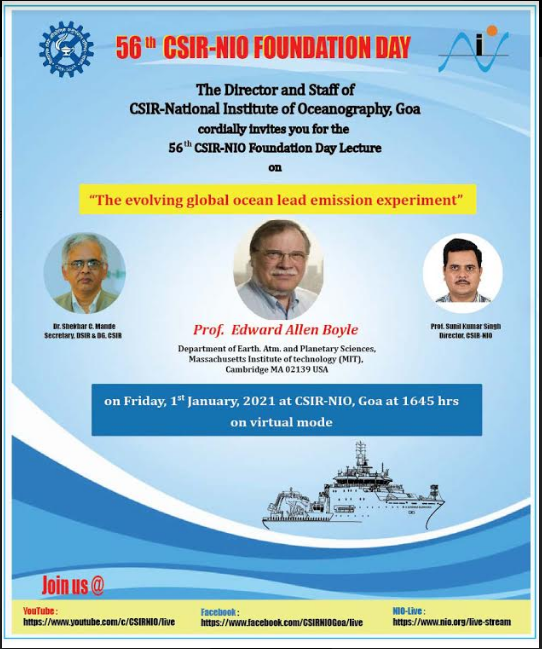Ministry of Earth Sciences
CSIR-NIO Foundation day on 1st January 2021
Posted On:
31 DEC 2020 12:08PM by PIB Mumbai
CSIR-National Institute of Oceanography (NIO), Dona Paula will be celebrating its 56th Foundation Day, on this occasion the institute will organise a public lecture on “The Evolving global ocean leads emission experiment” by Prof. Edward Allen Boyle, The Department of Earth, Atmospheric and Planetary Sciences (EAPS), Massachusetts Institute of Technology (MIT), Cambridge, on Friday, 1st January, 2021 at 1645hrs (on virtual mode).

Prof. Edward Allen Boyle is a marine geochemist involved in the study of the oceanic dispersal of anthropogenic emissions and the evolution of the Earth’s climate. He is interested in the areas of pale oceanography, paleoclimatology, and the chemistry of environmental waters. His research includes climatological studies of past ocean circulation patterns based on the fossil chemistry of oceanic sediments, control of late Pleistocene carbon dioxide pressure by ocean circulation and chemistry, and trace element variability in polar ice cores. He is also investigating the trace element chemistry of rivers and estuaries, and the chemical composition of seawater. In particular, he studies the variability of oceanic trace metals related to atmospheric transport of anthropogenic emissions and natural mineral dust into the ocean and mineral dust, and the transport and fate of pollutant lead and biologically essential iron in the ocean.
Prof. Boyle is a recipient of several prestigious awards such as the Urey Medal, European Association of Geosciences (2014), Member, National Academy of Sciences (2008), Honorary Fellow, European Union of Geosciences (2003), Patterson Medal, Geochemical Society (2000), Fellow, American Association for the Advancement of Science (1999), Geochemistry Fellow, Geochemical Society and European Association for Geochemistry (1998), and many more.
Prof. Boyle’s talk will emphasise on how we humans have increased the flux of lead (Pb) into the environment by a factor of ~20 fold. Although Pb put into the proximity of people has damaged our health in multiple ways, and even though most of the lead in the ocean is from human activities, open ocean Pb is not demonstrably harmful to marine life because of the extremely low concentrations (1-200 pmol/kg). But the spatial and temporal changes in Pb emissions constitute a global scale experiment on ocean chemistry: we dump the lead into the surface ocean and then can follow it throughout the ocean during the past two centuries. This talk will illustrate what we have learned about Pb in the ocean during the past 40 years.
You are all invited to join us in virtual mode through the link provided below.
YouTube :
https://www.youtube.com/c/CSIRNIO/live
Facebook :
https://www.facebook.com/CSIRNIOGoa/live
NIO-Live :
https://www.nio.org/live-stream
***
PIB Goa/PK
Follow us on social media:  @PIBMumbai
@PIBMumbai  /PIBMumbai
/PIBMumbai  /pibmumbai
/pibmumbai  pibmumbai[at]gmail[dot]com
pibmumbai[at]gmail[dot]com
(Release ID: 1684993)
Visitor Counter : 266